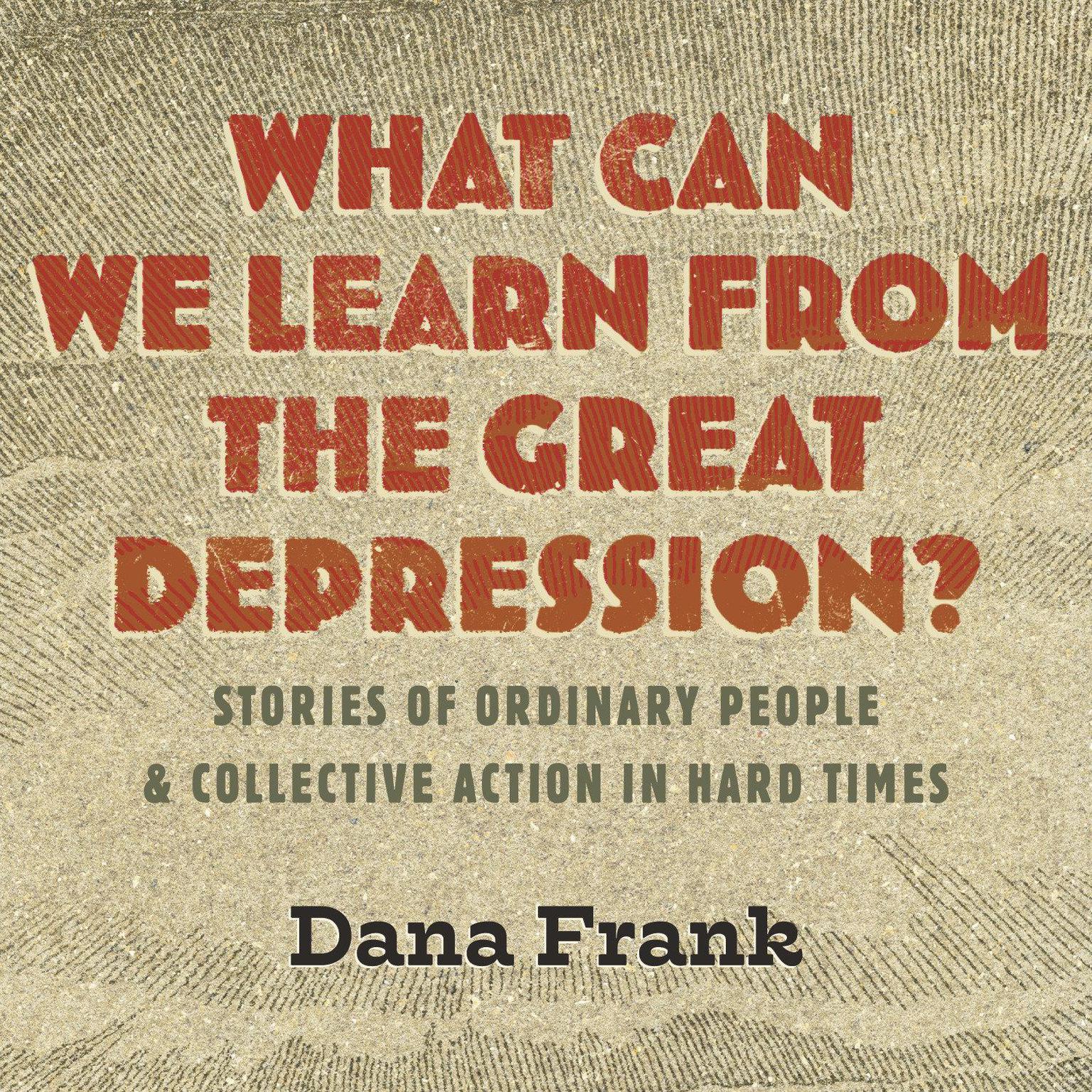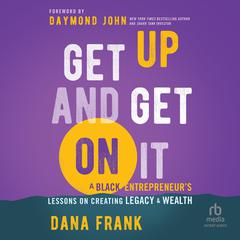 Play Audiobook Sample
Play Audiobook Sample
What Can We Learn from the Great Depression?: Stories of Ordinary People & Collective Action in Hard Times Audiobook
 Play Audiobook Sample
Play Audiobook Sample
Quick Stats About this Audiobook
Total Audiobook Chapters:
Longest Chapter Length:
Shortest Chapter Length:
Average Chapter Length:
Audiobooks by this Author:
Publisher Description
4 stories of resilience, mutual aid, and radical rebellion that will transform how we understand the Great Depression
Drawing on little-known stories of working people, What Can We Learn from the Great Depression? amplifies voices that have been long omitted from standard histories of the Depression era.
In four tales, Professor Dana Frank explores how ordinary working people in the US turned to collective action to meet the crisis of the Great Depression and what we can learn from them today. Readers are introduced to
- * the 7 daring Black women who worked as wet nurses and staged a sit-down strike to demand better pay and an end to racial discrimination
- * the groups who used mutual aid, cooperatives, eviction protests, and demands for government relief to meet their basic needs
- * the million Mexican and Mexican American repatriados who were erased from mainstream historical memory, while (often fictitious) white “Dust Bowl migrants” became enshrined
- * the Black Legion, a white supremacist fascist organization that saw racism, antisemitism, anti-Catholicism, and fascism as the cure to the Depression
While capitalism crashed during the Great Depression, racism did not and was, in fact, wielded by some to blame and oppress their neighbors. Patriarchy persisted, too, undermining the power of social movements and justifying women’s marginalization within them. For other ordinary people, collective action gave them the means to survive and fight against such hostilities.
What resulted were powerful new forms of horizontal reciprocity and solidarity that allowed people to provide each other with the bread, beans, and comradeship of daily life. The New Deal, when it arrived, provided vital resources to many, but others were cut off from its full benefits, especially if they were women or people of color.
What Can We Learn from the Great Depression? shows us how we might look to the past to think about how we can shape the future of our own failed economy. These lessons can also help us imagine and build movements to challenge such an economy—and to transform the state as a whole—in service to the common good without replicating racism and patriarchy.
Download and start listening now!
"How did ordinary Americans respond to the biggest economic crisis in the nation’s history during the Great Depression? They mobilized consumer cooperatives, mutual aid societies, eviction protests, rent and labor strikes, or demanded relief from the government. Some were Socialists, Communists, or adopted no labels for their exertions of survival. Some were multi-racial and left-oriented intent on social transformation, while others were fascist and white supremacist seeking to restore an exclusive vision of America for hardscrabble native-born Protestant white men. Dana Frank translates these rich archival discoveries of formidable historical episodes into lucid storytelling that offers inspiration and warnings for our own times. Do not sleep on the riveting chapter on wet nurses in Chicago who organized a novel strike to amplify the value of their domestic and reproductive labor in 1937. As Frank centers these Black women she imagines a movement in which the most inconsequential can be lifted so that all work and all workers can be treated with dignity and respect."
— Tera W. Hunter, author of Bound in Wedlock: Slave and Free Black Marriage in the Nineteenth Century
Quotes
-
Dana Frank is an inspired storyteller whose work serves inspired purpose. Here, she surfaces stories of folks who mostly have been invisibilized as agents of collective struggle against oppression, precarity, insecurity, and exclusion. In four seemingly disparate accounts of grassroots collective action during the Great Depression, Frank reveals much about how politically nimble regular people have been, to both heroic and rancid ends. Always situating the history of specific collective action in the larger system of racism and patriarchy in a capitalist state, Frank leaves us with much to cheer and much to fear. Enjoy this beautifully crafted book, then get to work democratizing the economy and society.
— Gwendolyn Mink, coauthor of Fierce and Fearless: Patsy Takemoto Mink, First Woman of Color in Congress -
Dana Frank is an inspired storyteller whose work serves inspired purpose. Here, she surfaces stories of folks who mostly have been invisibilized as agents of collective struggle against oppression, precarity, insecurity, and exclusion. In four seemingly disparate accounts of grassroots collective action during the Great Depression, Frank reveals much about how politically nimble regular people have been, to both heroic and rancid ends. Always situating the history of specific collective action in the larger system of racism and patriarchy in a capitalist state, Frank leaves us with much to cheer and much to fear. Enjoy this beautifully crafted book, then get to work democratizing the economy and society.
— Gwendolyn Mink, coauthor of Fierce and Fearless: Patsy Takemoto Mink, First Woman of Color in Congress -
In our time of climate crisis and resurgent fascism, many Americans have turned to ‘great men’ to lead us back to a time of imaginary virtues and moral clarity. Dana Frank, instead, looks to the history of the Great Depression for guidance and cautionary tales. In this honest, often surprising book, Frank reframes the 1930s as a moment in which common individuals struggled to make sense of a world in collapse. She reminds us of the precarity and promise of democracy in a nation prone to racial logics and xenophobic outbursts. We need this reminder, now, more than ever.
— Matt Garcia, author of Eli and the Octopus: The CEO Who Tried to Reform One of the World’s Most Notorious Corporations -
Frank translates her rich archival discoveries of formidable historical episodes into lucid storytelling that offers inspiration and warnings for our own times. Do not sleep on the riveting chapter on wet nurses in Chicago who organized a novel strike to amplify the value of their domestic and reproductive labor in 1937. As Frank centers these Black women, she imagines a movement in which the most inconsequential can be lifted so that all work and all workers can be treated with dignity and respect.
— Tera W. Hunter, author of Bound in Wedlock -
In this honest, often surprising book, Frank reframes the 1930s as a moment in which common individuals struggled to make sense of a world in collapse. She reminds us of the precarity and promise of democracy in a nation prone to racial logics and xenophobic outbursts. We need this reminder, now, more than ever.
— Matt Garcia, author of Eli and the Octopus -
In four seemingly disparate accounts of grassroots collective action during the Great Depression, Frank reveals much about how politically nimble regular people have been, to both heroic and rancid ends. Enjoy this beautifully crafted book, then get to work democratizing the economy and society.
— Gwendolyn Mink, coauthor of Fierce and Fearless -
A well-crafted work of social history that highlights little-known aspects of pre–World War II America.
— Kirkus Reviews -
The most important book on the Great Depression in a generation. The United States lurched between democratic renewal and outright fascism in the 1930s with no clear outcome in sight as European nations capitulated one by one to tyranny. Dana Frank skillfully shows how working-class people experimented with new forms of organizing based on traditions of struggles against racism as well as class and gender oppression. Even as many of their aspirations for equal justice remained unfulfilled—and forgotten—Frank shows that African American service workers, Mexican migrant laborers, and women organizers heroically transformed their mutual aid societies, unemployed movements, and industrial unions into a New Deal for the nation. Our understanding of the Great Depression and its contested legacies will never be the same thanks to this brilliant and timely book.
— Paul Ortiz, author of An African American and Latinx History of the United States -
In this urgent and illuminating book, Dana Frank shares stories revealing the collective power of marginalized workers, the real threat of fascism and the racism that fuels it, and the capacity of ordinary people to find and care for each other despite these deep structural divisions. She is that rare scholar able to mobilize the lessons of history against our present catastrophe.
— Robin D. G. Kelley, author of Hammer and Hoe: Alabama Communists During the Great Depression -
In this urgent and illuminating book, Dana Frank shares stories revealing the collective power of marginalized workers, the real threat of fascism and the racism that fuels it, and the capacity of ordinary people to find and care for each other despite these deep structural divisions. She is that rare scholar able to mobilize the lessons of history against our present catastrophe.
— Robin D. G. Kelley, author of Hammer and Hoe -
The US lurched between democratic renewal and outright fascism in the 1930s. . . . Frank skillfully shows how working-class people experimented with new forms of organizing. . . . Our understanding of the Great Depression and its contested legacies will never be the same thanks to this brilliant and timely book.
— Paul Ortiz, author of An African American and Latinx History of the United States
What Can We Learn from the Great Depression? Listener Reviews
Be the first to write a review about this audiobook!




